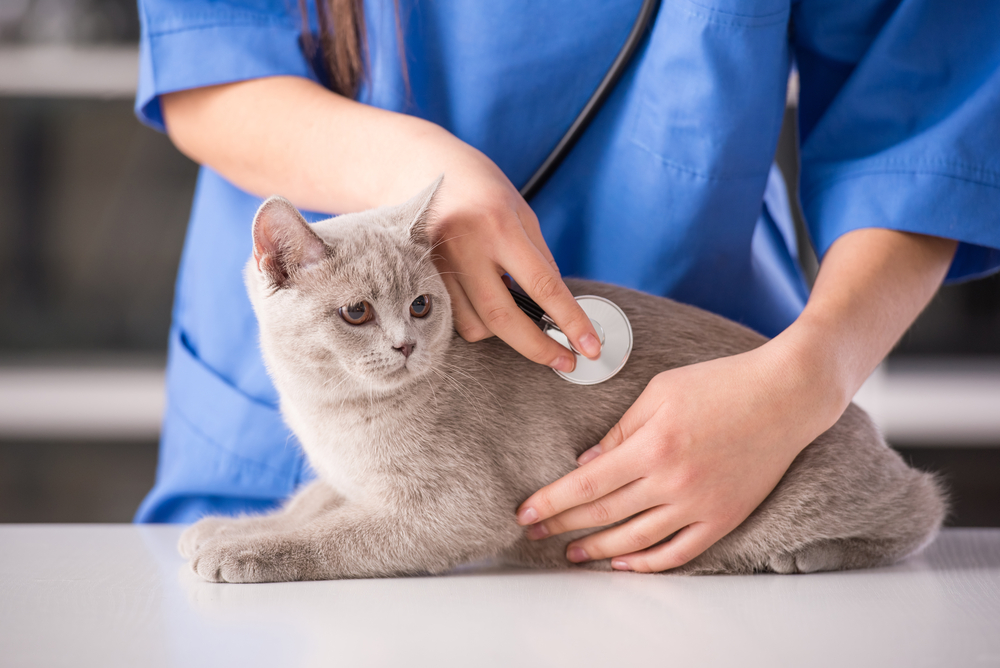Many people start the New Year by making resolutions to make a fresh start and improve their life. This time of year also is great for making resolutions that can help your pet. Our Pioneer Animal Hospital team loves finding ways to benefit pets’ lives, and we suggest four pet friendly New Year’s resolutions to help keep your pet happy and healthy all year long.
#1: Keep your pet fit and svelte
Vowing to lose weight and exercise more are common New Year’s resolutions for humans—they are also great objectives for pets. Pet obesity is a common problem that can significantly decrease your pet’s quality of life (QOL). Overweight pets commonly have breathing and mobility problems, and they are also at increased risk for conditions such as diabetes, cancer, kidney disease, and arthritis. Suggestions to ensure your pet stays in top form include:
- Regularly monitor your pet’s weight and body condition score (BCS) — Weigh your pet and evaluate their BCS every month to determine if they are gaining or losing weight.
- Calculate your pet’s energy needs — Many people feed their pets free choice, but this practice commonly leads to obesity. Accurately calculate your pet’s energy needs, so you feed them appropriately and avoid weight gain.
- Measure your pet’s portions — Once you know how much food your pet needs, precisely measure their meal portion with a kitchen scale or measuring cup. Especially for small pets, one kibble piece can equal too many extra calories.
- Give treats sparingly — Everyone loves to spoil their pets with treats, but the delectable goodies should contribute no more than 10% of their daily caloric intake. Give treats sparingly and choose healthy options such as carrots, snap peas, and broccoli.
#2: Make your pet’s health a priority
Prioritize your pet’s health by ensuring they receive regular wellness care. Adult pets should be evaluated by a veterinary professional once a year, and senior pets, who are at higher risk for disease, should be seen at least twice a year. This visits are important for many reasons, including:
- Building trust — Regular wellness visits help us get to know you and your pet and build a trusting relationship.
- Detecting problems — Pets frequently hide pain and illness signs so they don’t appear vulnerable, making detecting health complications difficult. During a wellness visit, we thoroughly examine your pet and perform diagnostics to check for issues such as heart disease, kidney disease, diabetes, and infection.
- Early detection — Many conditions are easier to manage and have a better prognosis when detected in the early stages, and annual or biannual examinations help ensure we catch your pet’s diseases as soon as possible.
- Establishing a baseline — These visits also help us establish your pet’s baseline, so we can track their diagnostic tests for changes that may indicate a health problem.
- Vaccine administration — Wellness visits are the perfect time to keep pets up to date on their vaccines to protect them against many dangerous infectious diseases.
#3: Protect your pet from parasites
Parasites are ubiquitous in our environment, and they can affect your pet whether they live inside or outside, or roam as they please. We recommend providing year-round parasite prevention medication for all pets to protect them from problematic pests, such as:
- Fleas — These small parasites can ingest up to 15 times their body weight in blood, and a heavy flea infestation can lead to anemia. In addition, fleas can transmit tapeworms and diseases such as cat scratch fever and the plague, and many pets have an allergy to flea saliva that causes severe itching and skin disease. Affected pets commonly groom themselves frequently and often remove all flea evidence from their coat, making detection difficult.
- Ticks — Ticks can transmit many problematic diseases, including Lyme disease, anaplasmosis, ehrlichiosis, and Rocky Mountain spotted fever, so your pet needs year-round preventive care. You should also check your pet carefully after they go outside, and remove any ticks you find as soon as possible.
- Heartworms — Mosquitoes are more than annoying pests—they can also transmit heartworms to dogs and cats and cause extensive damage to your pet’s heart and lungs. Pets frequently don’t exhibit signs until their condition is advanced.
#4: Look after your pet’s dental health
Dental disease often affects pets as young as 2 years of age. If your pet’s breath smells bad, they likely have some degree of periodontal disease, which can also cause painful, bleeding gums, loose or missing teeth, and tooth root abscesses. In some cases, the problematic bacteria enter the pet’s bloodstream and can damage their organs, including their kidneys and heart. Recommendations to protect your pet’s pearly whites include:
- Scheduling regular dental cleanings — A professional dental cleaning is the only way to effectively remove the bacteria from under your pet’s gum line, where they cause the most damage. Our veterinary team places your pet under general anesthesia to prevent them from experiencing discomfort or stress during the procedure, and to ensure we are able to thoroughly evaluate and clean your pet’s mouth.
- Brushing your pet’s teeth — Food particles left behind after your pet eats attract bacteria that accumulate to form plaque and tartar on your pet’s teeth if they are not removed. You should also brush your pet’s teeth daily to remove bacteria between professional veterinary dental cleanings.
These pet friendly resolutions should help keep your pet happy and healthy for 2023. If you would like to schedule a wellness examination or professional veterinary dental cleaning, contact our American Animal Hospital Association (AAHA)-accredited team at Pioneer Animal Hospital, so we can help your pet start the new year off right.


